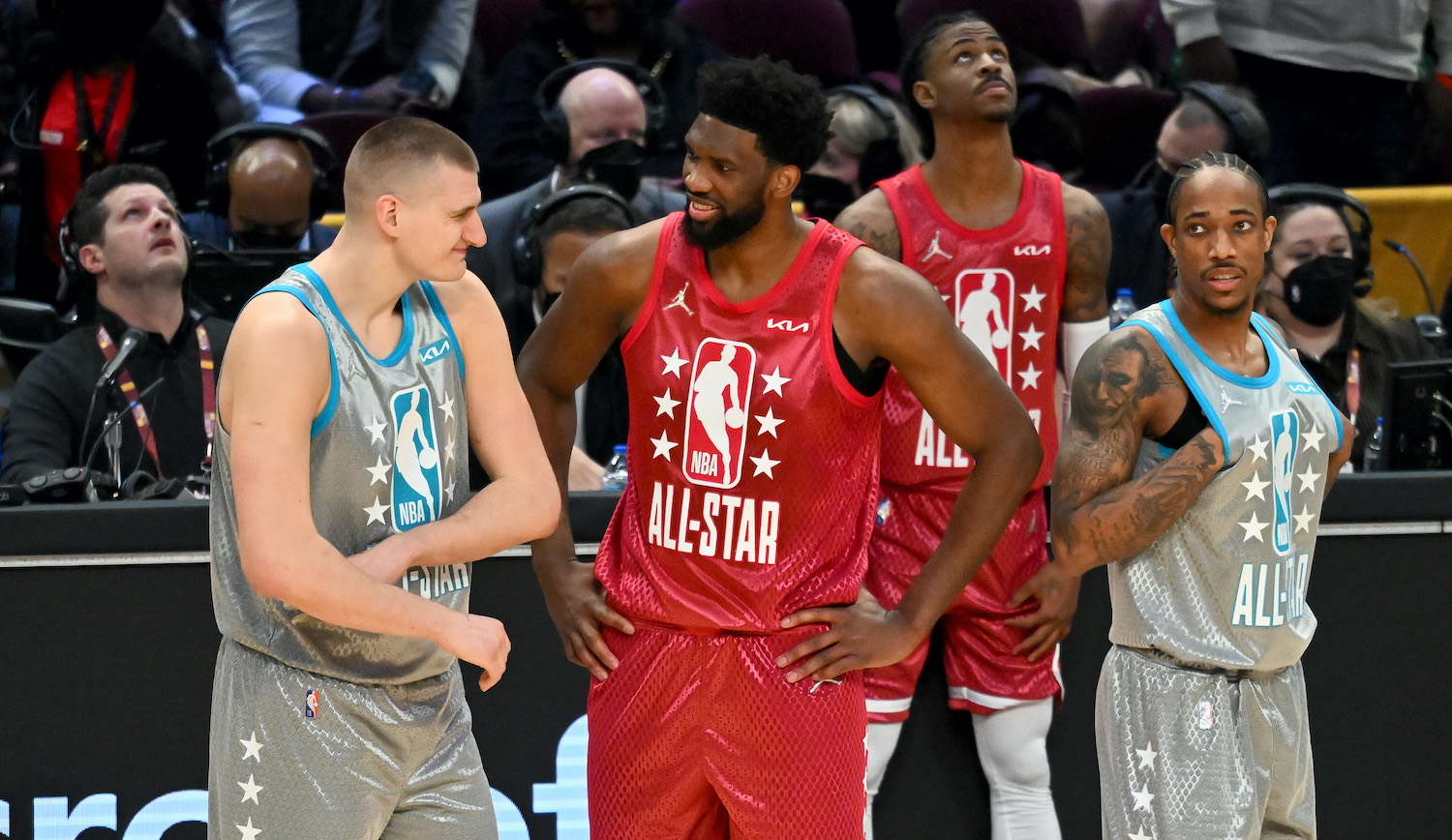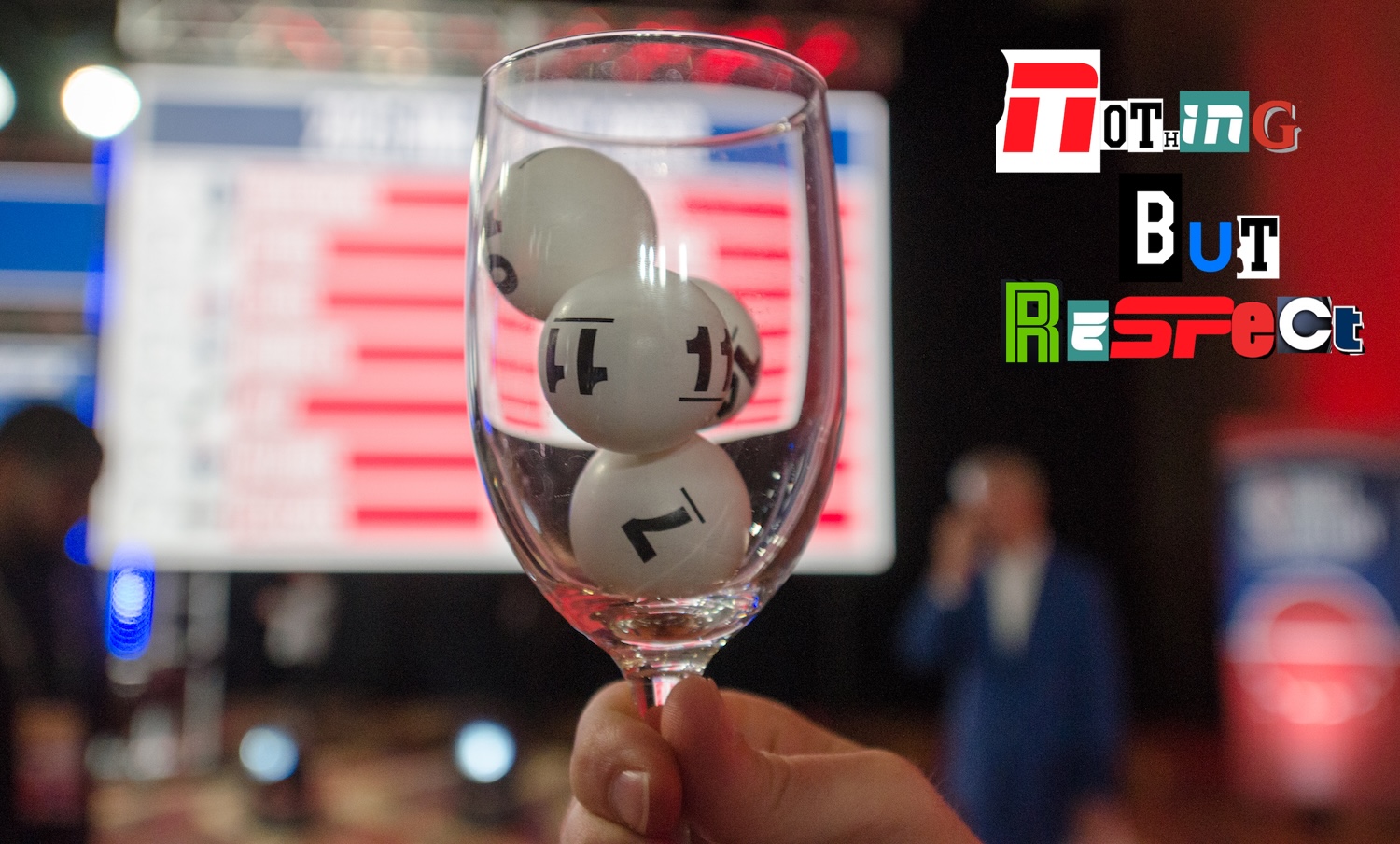This here NBA season is 80 percent over, and though the majority of teams still have plenty to play for, it is time now to take stock of a most enticing MVP race. Surely you have seen some of the debates, whose rhetoric ranges from the aggrieved (DeMar DeRozan is the MVP because that would validate my opinion of analytics nerds) to the sensible (Ja Morant is the coolest guy in the world) to the absurdist (Nikola Jokic does not exist.) After four years of fairly straightforward votes, we are probably headed for the most closely contested MVP race since the infamous Westbrook-James-Leonard-Harden debate of 2016–17. This year's race is probably more fun than that one, since nobody has to deal with stat-padding truthers or internecine revenge narratives or the underlying truth that LeBron James is always the best player in the league no matter who wins MVP. There is still a good deal of bullshit this time around, though. And so that is where we will start.
The Cool Guys Who Will Not Really Be Considered, But Had Good Seasons Anyway So We Should Say Their Names
The only wrench thrown into last year's proceedings was the quasi-candidacy of Chris Paul, who finished just fifth but earned a good deal of favorable media coverage during a resurgent year spent catalyzing a fun, underachieving Suns squad into a group of Finals-bound hardened killers. Paul deserves praise for his role in helping the Suns over that hump even though he did not deserve the MVP, just as he does not deserve this year's award for helping the Suns maintain their perch as the best team in the league throughout the season. As thin as the statistical case for Paul as the MVP this year is—he's at 14.9 points per game and is maybe not the best player on his own team—I am sympathetic to the argument that Suns Guys are underrepresented in this field. The thing is, Phoenix is so far ahead of the pack because of their strength as a coherent unit with three leaders, and this is an individual award; really, a Chris Paul MVP case is more accurately understood as a Monty Williams Coach of the Year case.
Steph Curry was the frontrunner for the first half of the season, when the Warriors were dominating everyone and he was shooting 42.3 percent on 13 threes per game as he was in November. But as his team has fallen off, so has Curry's candidacy.
Luka Doncic, meanwhile, is the anti-Curry. He came into the season disinterested and very obviously out of shape, but he's worked his way back into form and is leading a suddenly terrifying Mavericks team toward a serious pursuit of the fourth seed in the West. He's playing roughly as well as he ever has right now, but the body of work is simply not there as it is for the true tippy-top guys. We will get to them now.
The Narrative Candidates
Now it is time for us to consider the actual top-five candidates for MVP. Fierce as the debate is over their relative positions—and it is fierce enough to populate several excruciating weeks of ESPN daytime programming—I think everyone seriously considering this race agrees that all five deserve to be here. This is where many people mounting defenses of preferred candidates will turn once more to the time-honored tactic of asking What does "most valuable" mean, anyway? The history of the award doesn't actually provide a coherent answer to this question. It is not necessarily about the best player on the best team, nor the player with the best combination of stats and story, nor the player with the most significant holistic statistical output. This is a good thing! The MVP discussion is always a fun one for precisely this reason—the award is a true measuring stick of the season that values and synthesizes both cold numerical logic and the power of a good story. Making a convincing argument for any one candidate necessarily requires that you take seriously the others, and so demands a decent grasp of the season as a whole.
Which brings us to perhaps the most hotly debated candidacy of the serious contenders, that of DeMar DeRozan. A semi-forgotten man in San Antonio, one whose style of play the league seemed to have been passed by, DeRozan has had a stunning season for the biggest surprise in the league. The Bulls were supposed to be bad, or middling at best, and despite suffering the largest number of significant injuries in the league (fuck you Grayson Allen!), they have remained near the top of the the Eastern Conference standings all season. This is thanks mostly to DeRozan, who has been an unequaled bucket-getter throughout the season. He's notching 28.1 points per game, converting over half his two-point attempts, and playmaking just enough to keep his team among the top offenses in the league all year despite the absence of several key players. He's been the NBA's best player in clutch situations this year, and despite his relatively low three-point shooting output (he averages less than one three per game), you could make a credible argument that his skill at roasting defenders one-on-one and his cool comfort nailing tough midrange shots makes his utility as a player scale with the importance of a possession. When defenses are more locked in at the end of a close game, DeRozan's game works just as well as it does in the first quarter, and maybe even better thanks to his athleticism. His signature moment was back-to-back game-winners in January.
But the statistical case in not the strongest one you can make for DeRozan. It's the other stuff that proves his value most clearly, as the Bulls have been the biggest surprise of the season, and DeRozan's superstar play is the biggest factor in that success. This is mostly a narrative-driven case, but because it is a very good narrative, it's a pretty good case.
Here is a version of that story: Skepticism about DeRozan's worth as an NBA star seemed completely validated by the Raptors immediate title win after trading him and the ensuing failure of the Spurs to win anything with DeRozan at the helm. The book seemed closed on DeRozan as a team-leading player, and his anachronistic game made it tough for people to imagine that he could even be a very useful player as a secondary star. DeRozan has defied all these doubts by scoring one million points on statistically unfavorable shots, which means that people who are sick of hearing about PER and three-pointers and how Bill Russell would get laughed out of the gym by Maxi Kleber have coalesced around DeRozan as a candidate, in the hopes that him winning the award might prove that the imposition of numbers into basketball discourse and decision making is and has always been stupid. We will politely leave that debate to the side, but DeRozan has had a genuinely great season. He is not the MVP, though.
Ja Morant is also probably not the MVP, though he has been the most fun player to watch all year long and he has also made a significant leap. Morant has somewhat similar stats to DeRozan: 27.6 points, 6.6 assists, good advanced stats, and solid shooting for such huge volume. Also like DeRozan, his candidacy hinges on narrative. Morant has taken the leap from intriguing young player to no-shit superstar this season, and the confirmation that a budding young talent is going to make his mark on the NBA is always the most fun leap to witness. Morant's candidacy this year is on the same track as the Derrick Rose 2011 MVP season. The two seasons are almost statistically identical in every major category, and Rose was 22 and in his third season when he won, the same situation Morant is in now. Rose's victory hinged on the Bulls seizing the top seed in the East from the LeBron James Heat, and Morant's Grizzlies have taken a similar leap alongside him. Memphis is 44-22, tied for second in the Western Conference, with the eighth-best defense and sixth-best offense in the NBA.
The analog I see for the Grizzlies isn't to the 2011 Bulls or the 2011 Thunder, but rather the 2015 Warriors. Intrigue and promise rapidly evolved into dominance, and that team leapt all the way from an amusing first-round exit to winning an NBA title in one season. These Grizzlies are not as good as that team, which is fine because very few teams have been that good; critically, Desmond Bane and Jaren Jackson Jr. are not as good as Klay Thompson and Draymond Green, respectively, though their rise is taking place on a similar trajectory. Still, the numbers and the eye test both suggest that the Grizzlies are real Finals contenders. They play hard every single possession, they are unbelievably deep, and they love to fight and hit people like all good playoff teams do. All the skepticism about their legitimacy is centered on the fact that we haven't seem them crush it in the playoffs yet. Those Warriors faced the same arguments until they rolled to a title.
Anyway, we should not move past the aforementioned eye test, as the strongest point in Morant's favor is the obscene basketball shit he is doing every single night out. He is as athletic as Russell Westbrook ever was but way more creative and with way better vision. Morant's highlight reel, the best in the NBA by a mile, is replete with hilarious passes, stunning blocks, and violent dunks. In the process of dropping a franchise-record 52 points on the Spurs last week, Morant uncorked the best dunk of the season and also hit an outrageous buzzer-beater. You could make a coherent argument for Morant as the MVP based on his combination of highlights and narrative, though as cool as he's been this season, he is probably not in serious consideration for the award.
The Three Actual Contenders
It has come to this. One of Joel Embiid, Giannis Antetokounmpo, or Nikola Jokic will win the MVP this season. We should start with Antetokounmpo, as his MVP case is both the simplest and least likely to sway voters. The reigning Finals MVP is in the midst of the most efficient season of his career, with yet another 29-plus point, 11-plus rebound, six-assist season leading the Bucks to yet another high seed in the Eastern Conference. Antetokounmpo and the Bucks just won the Finals, and they're playing like it this season, for both better and worse. That is to say that they have a tendency to ease off the gas at times, and while they smoked the Suns this past weekend, they haven't consistently displayed the same dominant form they had last year. They are still an obvious title contender and Antetokounmpo will probably still be the most dominant player in any series he's in, though the all-important narrative component isn't quite there for Antetokounmpo this season. In any normal season, that wouldn't really matter that much, as Antetokounmpo is absolutely mashing everyone and putting up ridiculous stat-lines on offense while playing as good of defense as he ever has. I almost don't like framing Antetokounmpo's season within the MVP debate, since that's an invitation to nitpick what's been an absurdly great campaign by every available metric. The Bucks have notched a 40-25 record without Brook Lopez, which means Antetokounmpo has had to shoulder a larger interior load than he ever has before; Basketball Reference says he's spending 43 percent of his minutes at center. That he's now fully anchoring the defense while nearly leading the league in scoring is worth toasting.
The problem is Joel Embiid and Nikola Jokic are in their own tier right now. Embiid's stats are somewhat comparable to Antetokounmpo's, though he's scoring a tick more and anchoring an even better defense with a worse supporting cast, although that last bit obviously changed a few weeks ago. The ultra-advanced stats intended to quantify a player's output in one number favor Jokic and Antetokounmpo slightly over Embiid, but that should only be taken into consideration as just one factor among many. For one, Embiid is probably the most dominant player in the league right now. Jokic runs a one-man offense and invents new angles all the time, Giannis defies the notion of positionality, but Embiid warps the contours of the game around his will in a way neither man can. His physicality is so imposing, and his level of skill so high, that it really is impossible to fully take him out of any game. He's improved as a passer and shot-creator for others and he's shown himself to be just as reliable and efficient on a more talent-starved version of the Sixers this season.
Where Antetokounmpo has built his case alongside the same core he's had around him for two seasons, Embiid has distinguished himself by playing so well for a team whose second-best player simply refused to play. It helps your case when you are seen as overcoming some tribulations, and as odd of a player as Ben Simmons is, the Sixers are pretty gummy without him. Embiid has thus had to carry the team without any other remotely self-sufficient players (again, until the Harden trade), and he's mashed everyone in his path. Unlike Antetokounmpo, Embiid has not won before, and voters tend to avoid repeat winners unless they're statistically unchallenged.
Nikola Jokic might be in just that tier if he hadn't just won the MVP last season. His 2021-22 season currently ranks as the highest-PER season in NBA history. He is putting up essentially 26-14-8 on 57 percent shooting, he's improved as a defender, and he is doing this all for a Nuggets team that's been without their second- and third-best players all season. If you were to consider the MVP only by looking at advanced statistics, if you were to ignore narrative, eye test, and all the stuff that makes this discussion fun, you'd conclude that Jokic is the only MVP candidate. You should not do that, but I get the impression from the tenor of the discussion on TV that many commentators are simply not watching the Nuggets play. How else could you explain, say, Kendrick Perkins's apparent allergy to taking Jokic seriously?
One of the most oft-repeated arguments in favor of Embiid is that the Sixers are second in the superior East while the Nuggets are sixth in the inferior West, though the Nuggets are only 1.5 games worse than the Sixers. The on-off numbers also say the Nuggets are way more reliant on Jokic than either the Bucks are on Antetokounmpo or the Sixers are on Embiid. You also must consider that Jokic is probably the best passer in the whole NBA.
This find was special, even for Jokic 🤯 pic.twitter.com/DvigwsHYu4
— NBA (@NBA) February 28, 2022
When this discussion started in earnest a week ago—the MVP debate has been going all season but there's no reason to take too much of it seriously until after the all-star break—Embiid probably had a lead on Jokic. But Jokic just dropped a 46-point triple-double and scored 30 in the fourth quarter and overtime last night, so maybe he's inched ahead. I am not a voter, nor do I really give either player the advantage right now. I will note, though, that it indeed rules that the debate is close enough that each game matters this much. Both Antetokounmpo and Jokic have won MVPs before, so perhaps they will not be gunning as hard for the award this season. Embiid is also in the honeymoon period with James Harden, faces the Bulls without their starting center tonight, and is the only one of the big three who isn't facing any voter fatigue headwind. Realistically, I expect Embiid to win it this year. He's far from the only deserving candidate, but when there are this many it might just be a matter of whose turn it is.






